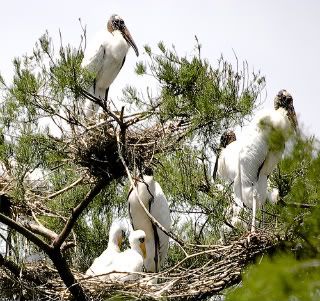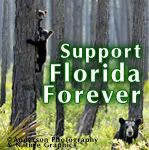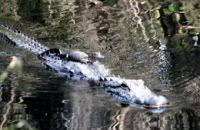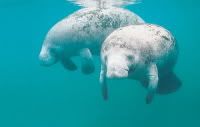"it's all connected" 

Endangered wood storks nesting in Fred George Basin, Leon County.
Environmental groups achieve wetland protections in settlement of two lawsuits near Corkscrew Swamp Sanctuary
By Aislinn Maestas
National Wildlife Federation
A coalition of five environmental groups, including National Wildlife Federation and Florida Wildlife Federation, has settled two lawsuits in exchange for significantly increased wetland and habitat protections. The coalition has been opposing several proposed residential and golf projects in the ecologically important Cocohatchee Slough near Corkscrew Swamp Sanctuary in Florida.
After over four years of litigation and several iterations of project permits, the environmental coalition and developer G.L. Homes of Sunrise, Florida, have agreed to over 200 additional acres of wetland impact reductions, restoration of endangered wood stork habitat, and relocation of Logan Boulevard onto old farm fields instead of through wetlands. This is in addition to $3 million of additional offsite mitigation secured in previous litigation on Saturnia Falls. Joining NWF and FWF in this victory are Audubon of Florida, Collier County Audubon Society, and Conservancy of Southwest Florida.
The settlement of these two federal lawsuits was preceded by other coalition legal actions at the state level challenging impacts to downstream water quality, flood protection and aquifer recharge, in addition to wetland and wildlife harm. All these water resource factors will benefit greatly from the significantly increased levels of wetland protection and restoration in this settlement.
In addition to these very positive results for wood storks and other imperiled species plus water resources, the same environmental coalition had earlier in October 2009 won a federal lawsuit against another residential golf course project called Mirasol which would destroy over 600 acres of unique wetlands in the same Cocohatchee Slough which emanates from Corkscrew Swamp. That is well over twice the acreage of wetlands destroyed on Parklands Collier and Saturnia Falls combined. In that decision a Southern District Court judge revoked Mirasol’s permit based on complaints over illegal wetland and wildlife impacts.
Jan Goldman-Carter, Water Resources Counsel for National Wildlife Federation, observed, “The revocation of the Mirasol permit offers another opportunity for the Army Corps and the South Florida Water Management District to require the avoidance of additional wetland, water and habitat impacts, additional protection, and true habitat restoration on the Mirasol site.”
Mirasol’s destruction of wetlands, combined with other wetland losses in the region, would have devastating effects on the wood stork nesting colonies at Corkscrew Swamp, the largest in the nation and vital to the species’ recovery. This cumulative destruction would also harm downstream water quality, flood protection, and water supply for the region.
Looking for opportunities to prevent further destruction of wetlands and habitat, the environmental groups are also working with state and federal agencies to improve the way they permit and compensate for wetland losses incurred when development is sited in Florida wetlands. Recommendations currently under consideration could significantly reduce or eliminate such impacts before the projects end up in court, wasting time and money, or worse, getting built and irrevocably destroying habitat for declining wildlife throughout Florida and harming the public’s interest in protection of vital water resources.
Wildwood Preservation Society is a non-profit 501(c)(4) project of the Advocacy Consortium for the Common Good. Click here to learn more.
Saturday, July 10, 2010
Good news for Wood Storks in South Florida!
Labels:
biodiversity,
birds,
Conservation,
Corkscrew Swamp,
Endangered Species,
Florida,
sprawl,
wetlands,
Wildlife,
Wood Stork,
wood storks
Subscribe to:
Post Comments (Atom)













No comments:
Post a Comment